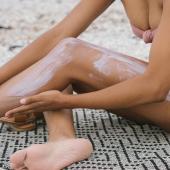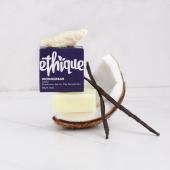Why Oil is Good for Your Skin
We believe in the power of cream-based formulas. While this is different from the powders you may be used to, our butter and oil-based products work double-duty to nourish your skin while imparting the pigment you're looking for. Read on to find out why oil and skin make such a good pair.
"Oil free" is one of the greatest rouses ever sold by the cosmetics industry. When it comes to radiant, healthy skin, oil is the original beauty secret.
So why have we been taught that oil is the enemy and that stripping our skin of its natural oil will cure our dermal woes? I wish I knew.
Oil Prevents Oily Skin
I found out the hard way that acne is not exclusive to teenagers. After trying "everything," I stumbled upon the simplest breakout solution: simplify my cleansing routine and rely on oil as a moisturizer.
Why did this work? Stripping the skin of its natural oils (or keeping your skin too dry, generally) with harsh cleansers puts the skin's sebaceous glands into overdrive to compensate for the loss. The result is excess oil production and trips to the bathroom with your oil-blotting sheets (emergency tip: toilet seat covers also work quite well). Alternately, adding oil to the skin allows the sebaceous glands to slow production because the skin's already been replenished with the oil it needs. (Personal testimony: Since adding oil into my skincare and makeup routine, I am no longer a bathroom blotter!)
SCIENCE! Why your skin likes oil
Essential fatty acids replenish the skin and keep it hydrated and nourished. Because our bodies don't make these crucial components, it's important to get them from an outside source such as oil.
Oils also protects the skin's acid mantle (your skin's shield against the outside world), and heals and supports the skin's lipid barrier when it's been compromised by environmental factors like harsh cleansing, extreme temperatures and weather, and travel. Because of their protective function, oils support and speed the skin's own healing process. (source)
So many choices! Which oils to use?
Check out this post on how to choose the best oil for your skin. I'll continue to give updates of the properties of different oils (even beyond those in the post), but in the meantime, consider easing in with seed oils, as they're what are considered "dry oils" -- that is, they penetrate quickly and deeply and don't leave an oily finish. My personal favorite is jojoba oil, which actually isn't an oil at all, but a wax esters. Shea butter (okay, perhaps not an "oil" either) is also a favorite. Keep in mind that quality (and often price) is important, as you want cold-pressed oils that are the least processed or refined, and do not contain additives or by-products.




